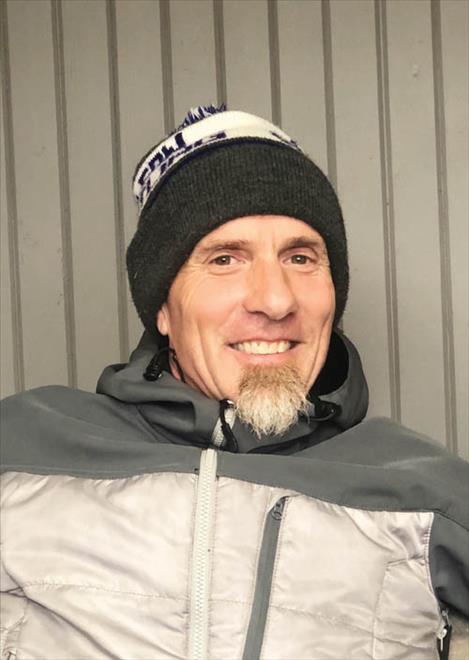Two run for Polson mayor seat
Hey savvy news reader! Thanks for choosing local.
You are now reading
1 of 3 free articles.
Two newcomers to the political arena are vying to serve as mayor of Polson, a post currently held by Paul Briney, who opted not to run for a second term.
Eric Huffine
Background: Born, raised and educated in Polson; has three children in middle school and high school
Work & Volunteer Experience: Been self-employed since 1995; currently owns Riverside Recreation, a boat rental adjacent to Riverside Park, and Wall and Slab, a concrete construction business that employs 20-30 people, depending on the season; has coached wrestling “off and on” at Polson schools for 20 years
Eric Huffine paraphrases a quote from Teddy Roosevelt when explaining why he’s running for mayor: “Complaining about a problem without posing a solution is called whining.”
“I feel like the majority of people complaining don’t want to solve the problem – they want it solved for them. That was me,” he says. “In the end, if nobody steps forward to help mitigate and provoke thoughts and discuss things, it can’t ever change.”
For the fourth-generation Polson resident, navigating growth is the central issue the city faces. “Either you embrace the change and try to be proactive about it or you bow your neck and fight change – which level of unhappiness are you willing to embrace?”
Where the lack of affordable housing is concerned, he perceives city government as uncooperative. “I feel like there’s really not a welcome mat in front of City Hall,” he says. “Instead of coming up with all the reasons something can’t happen let’s just figure out how to make things happen when it’s the right project or right cause – if it enhances the community.”
He points to Kalispell, where his crew is currently working on a large apartment complex, as an example. To speed up the project, he says building codes have been relaxed “as long as an engineer is signing off on it and willing to take responsibility.”
Polson, he adds, has a negative reputation with contractors and developers due to its stringent codes and permitting process. “You’re never going to build economic housing and have to jump through all the hoops the city of Polson makes you to jump through,” he says. “The only way to build affordable housing is to make it affordable to build.”
To that end, he suggests the city look at relaxing some of its building codes and giving incentives to builders in the form of tax credits to reduce impact fees.
Polson is also facing a spike in growth during the tourist season and beyond that frustrates locals with increased traffic and congestion. To Huffine, that growth also presents opportunities for the city to make the most of its assets. “We live in a beautiful place, with all sorts of resources here we could capitalize on.”
Many of the community’s businesses rely on the 55-day summer season when tourists abound. “When people are sitting at the intersection of Hwy. 93 and 35 contemplating whether they want to come into town or turn right, I think we could get them to turn left,” by offering more amenities.
Polson is struggling to find the equilibrium between growth, which can support infrastructure needs, and maintaining “our quaint, quiet community.”
“That’s the balance: You need the money but you don’t want the people who have the money to come.”
“It’s all revenue driven,” he adds. “I’m a businessman and it has to run like a business, that or you better get yourselves the best grant writers in the world – the money has to come from somewhere.”
Rachel Wanderscheid
Background: Grew up in Ashland, Oregon, earned bachelor and law degrees from the University of Montana, graduating in 2011.
Work & Volunteer Experience: Recently hired as director of the Montana Afterschool Alliance, a statewide organization that supports after-school and summer programs for kids; previously employed by the public defenders office of the Confederated Salish and Kootenai Tribes; also worked in Helena for the Montana Office of the State Public Defender and the Montana Coalition Against Domestic and Sexual Violence; is a participant in Leadership Flathead Reservation.
Rachel Wanderscheid wasn’t contemplating a political future until a week before the candidate-filing deadline in June when she discovered no one had filed to replace the outgoing mayor. Encouraged by friends and community members, she paid a visit to the elections office. “I felt a responsibility to step up for the position to try to make sure our town had leadership.”
As an attorney, she’s cultivated the art of building consensus, and believes it’s a skill that could serve her well as mayor. “I have a lot of experience dealing with very different opinions and I’ve learned how to try to find what people can agree on to come up with solutions.”
Since filing for office, she’s also made a point of learning how city government works. She’s read the city charter, spoken to current and former mayors, visited with commissioners, and asked city staff “what qualities they think the mayor needs to have and what issues will be coming up in this four-year term.”
She regularly tunes in to commission meetings via Zoom and has been connecting with constituents and members of the business community.
Along the way, she’s discovered “everybody really cares about this town. People have differences on the best way to approach each issue, and which issues are most pressing, but generally everyone seems to want to work together and try to come up with solutions to the growth we’re facing and other issues like housing, labor shortages and infrastructure.”
As a recent homeowner, Wanderscheid has personal experience with the housing crunch. She bought her home in 2018 when she couldn’t find a place to rent but could afford a down payment. With escalating home prices and plummeting housing stock, “I don’t think that would have been the case if I had to move here this past year.”
“The mayor and commission aren’t going to solve this issue alone,” she adds. “We have to work with staff and external experts to get good options. It’s not something we can ignore.”
In addition to the housing shortage, a spike in growth is also posing challenges.
“We need a plan so that we grow in a way that takes into consideration those of us who live here, those who might move here, and those who live here only half a year,” she says. “We’re better off talking through issues and trying to come up with solutions before there are drastic problems.”
The commission also needs an accurate picture of roads, water and sewer systems. “We can’t grow without making sure infrastructure is in place to support that growth.”
As mayor, Wanderscheid would emphasize communication and cooperation among constituents, and city, county, tribal and state governments. “Generally we can all do a lot better if we work together and understand each other’s perspectives.”

















